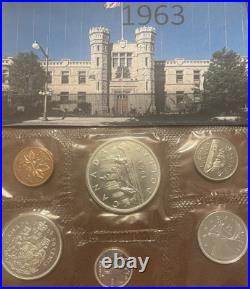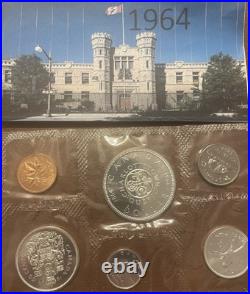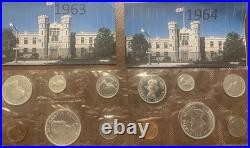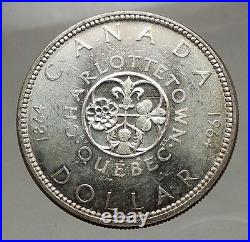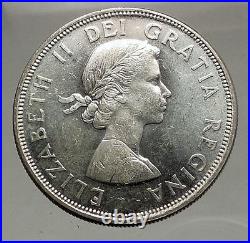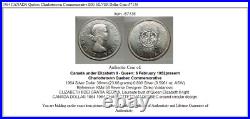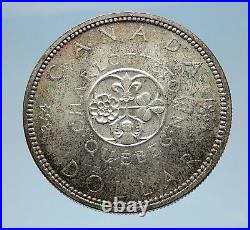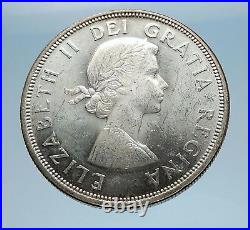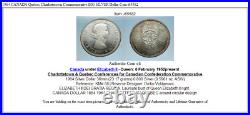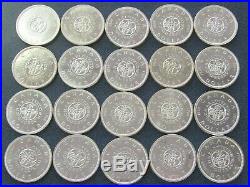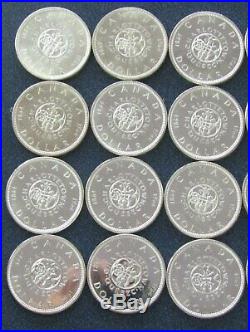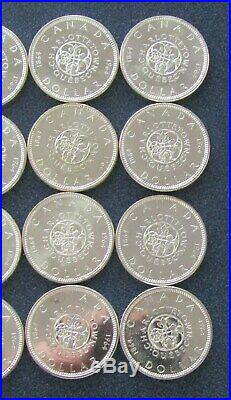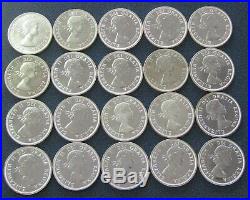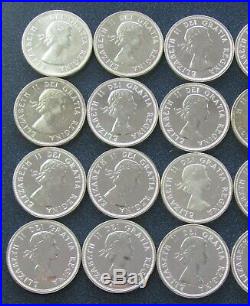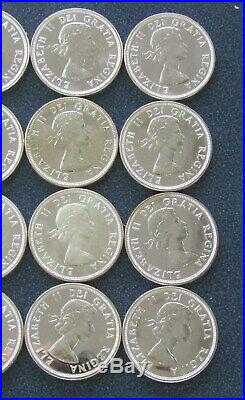Item: i65582 Authentic Coin of. Queen: 6 February 1952-present Charlottetown & Quebec Conferences for Canadian Confederation Commemorative 1964 Silver Dollar 36mm (23.17 grams) 0.800 Silver 0.5961 oz. CANADA DOLLAR 1864 1964 CHARLOTTETOWN QUEBEC around circular design. The Charlottetown Conference was held in Charlottetown, Prince Edward Island for representatives from the colonies of British North America to discuss Canadian Confederation. The conference took place between September 1 through 7, 1864. The conference had been planned as a meeting of representatives from the Maritime colonies: Nova Scotia, New Brunswick and Prince Edward Island. Newfoundland agreed with the movement, but was not notified in time to take part in the proceedings. Britain encouraged a Maritime Union between these colonies, hoping that they would then become less economically and politically dependent on the Crown, and provide for greater economic and military power for the region in light of the American Civil War. However, another colony, the Province of Canada, comprising present-day Ontario and Quebec, heard news of the planned conference and asked that the agenda be expanded to discuss a union that would also include them. In August 1864 Newfoundland also asked to be allowed to join the conference. Coincidentally there was a circus in Charlottetown during the conference, and it was much more interesting to the majority of the population. There was no one working at the public wharf at the foot of Great George Street when the Canadian delegates arrived on the steamship SS Victoria, so Prince Edward Island representative William Henry Pope had to handle receptions by himself, including rowing out to greet the new arrivals. The Canadian delegates stayed each night on board the SS Queen Victoria, as circus-goers and the Maritime delegates had taken up the accommodations in town. The Quebec Conference was the second meeting held in 1864 to discuss Canadian Confederation. The 32 delegates from the Province of Canada, Nova Scotia, New Brunswick, and Prince Edward Island had agreed at the close of the Charlottetown Conference to meet again at Quebec City (at the Old Parliament Building) October 1864. Newfoundland also sent two observers, but did not participate directly in the proceedings. British Columbia did not participate in the conference. The conference began on October 10. It lasted for over two weeks. The major source of conflict at the conference was between those who favoured a “legislative union”, i. A unitary state, such as John A. Macdonald, and those who favoured stronger provincial rights. Representatives from the Maritimes and Canada East (now Quebec) tended to argue for provincial rights, fearing they would lose their cultural identity under a centralized unitary state. Macdonald thought the failure of a weak central power was evident in the American Civil War, which was still being fought in the United States as the delegates met in Charlottetown and Quebec. The delegates eventually compromised, dividing powers between a “general” parliament and “local” provincial legislatures. They also decided to have an elected lower house, the House of Commons, and an appointed upper house, the Senate, although there was considerable debate about how many senators each province would have. The Prince Edward Island delegation called for a scheme similar to the Triple-E Senate proposal of the 1990s. Eventually, a proposed structure for the government was written out in the form of the seventy-two resolutions at the end of the conference. 72 resolutions were drawn up. George-Étienne Cartier was largely responsible for convincing the French-Canadian members of the Legislature in Canada to accept the resolutions, even though he himself did not support such a strong central government. Albert James Smith led the opposition to Confederation in New Brunswick, while Joseph Howe led the opposition in Nova Scotia, but both of these provinces eventually agreed to join the union. Only Prince Edward Island rejected the resolutions. Canada, New Brunswick, and Nova Scotia then set about securing partial autonomy from the British government, which culminated in a third London Conference in 1866, and the British North America Act on July 1, 1867. Canada is a country, consisting of ten provinces and t hree territories, in the northern part of the continent of North America. It extends from the Atlantic to the Pacific and northward into the Arctic Ocean, covering 9.98 million square kilometres (3.85 million square miles) in total, making it the world’s second-largest country by total area and the fourth-largest country by land area. Canada’s common border with the United States forms the world’s longest land border. Canada is sparsely populated overall, the majority of its land territory being dominated by forest and tundra as well as the mountain range of the Rocky Mountains; about four-fifths of the population live near to the southern border. The majority of Canada has a cold or severely cold winter climate, but southerly areas are warm in summer. The land now called Canada has been inhabited for millennia by various Aboriginal peoples. Beginning in the late 15th century, British and French colonies were established on the region’s Atlantic coast. As a consequence of various conflicts, the United Kingdom gained and lost North American territories until left, in the late 18th century, with what mostly comprises Canada today. Pursuant to the British North America Act, on July 1, 1867, three colonies joined to form the autonomous federal Dominion of Canada. This began an accretion of provinces and territories to the new self-governing Dominion. In 1931, Britain granted Canada near total independence with the Statute of Westminster 1931 and full sovereignty was attained when the Canada Act 1982 severed the vestiges of legal dependence on the British parliament. Canada is a federal parliamentary democracy and a constitutional monarchy, Queen Elizabeth II being the current head of state. The country is officially bilingual at the federal level. It is one of the world’s most ethnically diverse and multicultural nations, the product of large-scale immigration from many countries, with a population of approximately 35 million as of 2015. Its advanced economy is the eleventh largest in the world, relying chiefly upon its abundant natural resources and well-developed international trade networks. Canada’s long and complex relationship with the United States has had a significant impact on its economy and culture. Canada is a developed country and one of the wealthiest in the world, with the tenth highest nominal per capita income globally, and the eighth highest ranking in the Human Development Index. It ranks among the highest in international measurements of government transparency, civil liberties, quality of life, economic freedom, and education. Canada is a Commonwealth Realm member of the Commonwealth of Nations, a member of the Francophonie, and part of several major international and intergovernmental institutions or groupings including the North Atlantic Treaty Organization, the G8, the Group of Ten, the G20, the North American Free Trade Agreement and the Asia-Pacific Economic Cooperation forum. World-renowned expert numismatist, enthusiast, author and dealer in authentic ancient Greek, ancient Roman, ancient Byzantine, world coins & more. Ilya Zlobin is an independent individual who has a passion for coin collecting, research and understanding the importance of the historical context and significance all coins and objects represent. Send me a message about this and I can update your invoice should you want this method. Getting your order to you, quickly and securely is a top priority and is taken seriously here. Great care is taken in packaging and mailing every item securely and quickly. What is a certificate of authenticity and what guarantees do you give that the item is authentic? You will be very happy with what you get with the COA; a professional presentation of the coin, with all of the relevant information and a picture of the coin you saw in the listing. Additionally, the coin is inside it’s own protective coin flip (holder), with a 2×2 inch description of the coin matching the individual number on the COA. Whether your goal is to collect or give the item as a gift, coins presented like this could be more prized and valued higher than items that were not given such care and attention to. When should I leave feedback? Please don’t leave any negative feedbacks, as it happens sometimes that people rush to leave feedback before letting sufficient time for their order to arrive. The matter of fact is that any issues can be resolved, as reputation is most important to me. My goal is to provide superior products and quality of service. How and where do I learn more about collecting ancient coins? Visit the Guide on How to Use My Store. For on an overview about using my store, with additional information and links to all other parts of my store which may include educational information on topics you are looking for. This item is in the category “Coins & Paper Money\Coins: Canada\Commemorative”. The seller is “highrating_lowprice” and is located in this country: US. This item can be shipped worldwide.
- Country/Region of Manufacture: Canada
- Year: 1964
- Certification: Uncertified
- Circulated/Uncirculated: Circulated
- Denomination: Denomination_in_description
